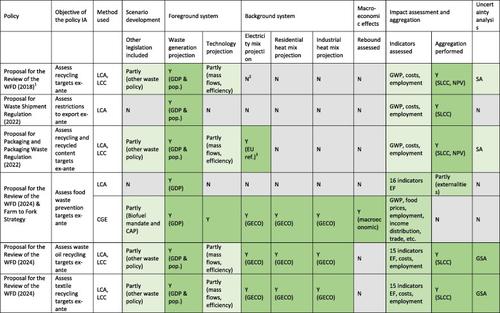当前位置:
X-MOL 学术
›
Waste Manag.
›
论文详情
Our official English website, www.x-mol.net, welcomes your feedback! (Note: you will need to create a separate account there.)
Life cycle thinking for the assessment of waste and circular economy policy: status and perspectives from the EU example
Waste Management ( IF 8.1 ) Pub Date : 2024-03-14 , DOI: 10.1016/j.wasman.2024.02.037 Valeria De Laurentiis , Carla Caldeira , Serenella Sala , Davide Tonini
Waste Management ( IF 8.1 ) Pub Date : 2024-03-14 , DOI: 10.1016/j.wasman.2024.02.037 Valeria De Laurentiis , Carla Caldeira , Serenella Sala , Davide Tonini

|
Life cycle thinking methods such as life cycle assessment (LCA) and costing (LCC) were originally developed to assess the performance of products and services (business-making decisions). However, they are increasingly deployed to support policy-making along the entire policy cycle, including via impact assessment (IA) of different policy options. These applications are associated with a number of challenges, mainly related to the dynamic and prospective nature of policy IA, typically forward-looking into 10–20 years ahead. This requires the application of prospective scenario analyses to develop the baseline scenario, reflecting the ‘do nothing’ into the future (business-as-usual), and the alternative scenarios, reflecting the consequences incurred by the implementation of the policy options under study. Such prospective and broadened boundary nature of policy IA challenges traditional LCA/LCC practices mostly based on retrospective, static scenarios and datasets. The present study provides an overview of recent IA studies supporting waste policy to show the state-of-the-art and the main challenges associated with the application of life cycle methods in IA, focusing on the most recent EU waste and circular economy policies. Moreover, since specific and transparent guidance on how to implement consistently these methods in policy IA is lacking, the study provides an initial guidance for application of life cycle thinking in IA drawing upon the knowledge obtained conducting waste policy IA studies. Key challenges in the field are still to be addressed, and might inspire further research to improve the application of life cycle thinking to policy assessment.
中文翻译:

评估废物和循环经济政策的生命周期思维:欧盟实例的现状和观点
生命周期思维方法,例如生命周期评估(LCA)和成本核算(LCC)最初是为了评估产品和服务的绩效(业务决策)而开发的。然而,它们越来越多地用于支持整个政策周期的政策制定,包括通过不同政策选项的影响评估(IA)。这些应用与许多挑战相关,主要与政策 IA 的动态和前瞻性性质有关,通常具有未来 10-20 年的前瞻性。这需要应用前瞻性情景分析来制定基准情景,反映未来“什么都不做”(一切照旧),以及替代情景,反映实施所研究的政策选择所产生的后果。政策IA的这种前瞻性和扩大的边界性质对主要基于回顾性、静态情景和数据集的传统LCA/LCC实践提出了挑战。本研究概述了最近支持废物政策的IA研究,以展示与IA中应用生命周期方法相关的最新技术和主要挑战,重点关注最新的欧盟废物和循环经济政策。此外,由于缺乏关于如何在政策IA中一致实施这些方法的具体和透明的指导,因此该研究利用废物政策IA研究中获得的知识,为IA中生命周期思维的应用提供了初步指导。该领域的关键挑战仍有待解决,并可能激发进一步的研究,以改进生命周期思维在政策评估中的应用。
更新日期:2024-03-14
中文翻译:

评估废物和循环经济政策的生命周期思维:欧盟实例的现状和观点
生命周期思维方法,例如生命周期评估(LCA)和成本核算(LCC)最初是为了评估产品和服务的绩效(业务决策)而开发的。然而,它们越来越多地用于支持整个政策周期的政策制定,包括通过不同政策选项的影响评估(IA)。这些应用与许多挑战相关,主要与政策 IA 的动态和前瞻性性质有关,通常具有未来 10-20 年的前瞻性。这需要应用前瞻性情景分析来制定基准情景,反映未来“什么都不做”(一切照旧),以及替代情景,反映实施所研究的政策选择所产生的后果。政策IA的这种前瞻性和扩大的边界性质对主要基于回顾性、静态情景和数据集的传统LCA/LCC实践提出了挑战。本研究概述了最近支持废物政策的IA研究,以展示与IA中应用生命周期方法相关的最新技术和主要挑战,重点关注最新的欧盟废物和循环经济政策。此外,由于缺乏关于如何在政策IA中一致实施这些方法的具体和透明的指导,因此该研究利用废物政策IA研究中获得的知识,为IA中生命周期思维的应用提供了初步指导。该领域的关键挑战仍有待解决,并可能激发进一步的研究,以改进生命周期思维在政策评估中的应用。



























 京公网安备 11010802027423号
京公网安备 11010802027423号